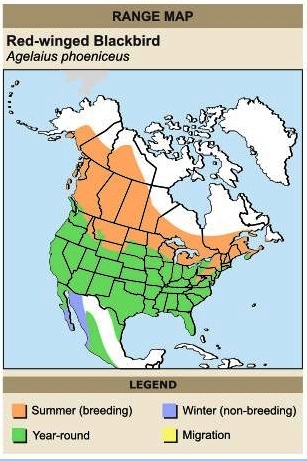
Small blackbird with
jet-black body
and bright red shoulder patches edged with yellow on bottom. Runs or
hops while foraging on the ground. Eats seeds, grains, berries, fruits,
insects, caterpillars, spiders, snails, grubs
and mollusks. Strong direct flight
on rapid wing beats.
The male Red-winged blackbird has a glossy-black body and bright red
shoulder patches edged with yellow.
|
RED-WINGED
BLACKBIRD
Agelaius phoeniceus
PASSERIFORMES
Blackbirds and Orioles (Icteridae)
Range and Habitat
Breeds from Alaska east across Canada to Newfoundland and south to northern
Baja California, central Mexico, the Gulf Coast, and Florida. Spends
winters regularly across the U.S. north to British Columbia, Great Lakes,
and Pennsylvania.
Preferred habitats include fresh and saltwater marshes, rice paddies,
sedge meadows, alfalfa fields, and other croplands.
SOUND:
"o-ka-leeee", "konk-a-ree"
Each pair
of Red-winged Blackbirds raise 2-3 broods per season. Each time they
build a new nest, which keeps the nest from becoming infected with parasites
that could kill the baby birds.
During migration the Red-winged Blackbird
can travel at over 30 mph.
The Red-winged Blackbird is native to North America.
A group of blackbirds has many collective nouns, including a "cloud",
"cluster", and "merl" of blackbirds.
The Red-winged Blackbird is found throughout North and Central America.
Breeding habitats spread from Alaska, Newfoundland and Florida, the
Gulf of Mexico, Mexico and Guatemala. Some populations may also be found
in El Salvador, Honduras and Costa Rica. Winters may be spent in Pennsylvania
and British Columbia, but northern populations usually migrate south
to Mexico and the southern United States.
This species typically feed on seeds and insects. These birds also nest
in small colonies and migrate in single-sex flocks. Nests are built
in cattails, grasslands or willow bushes.
|




